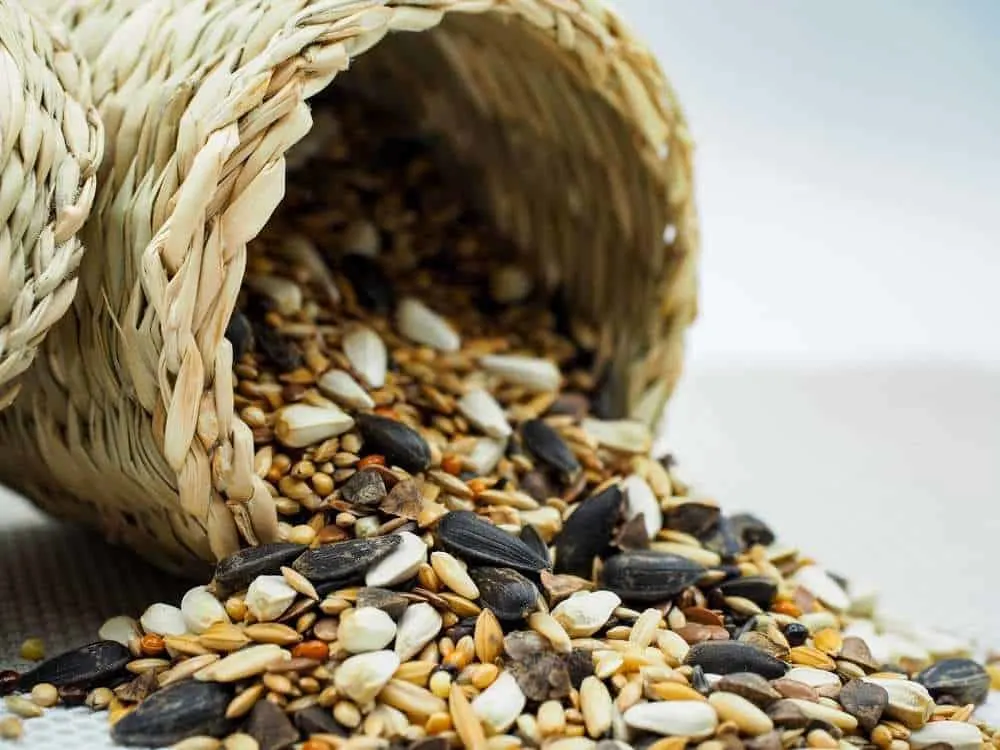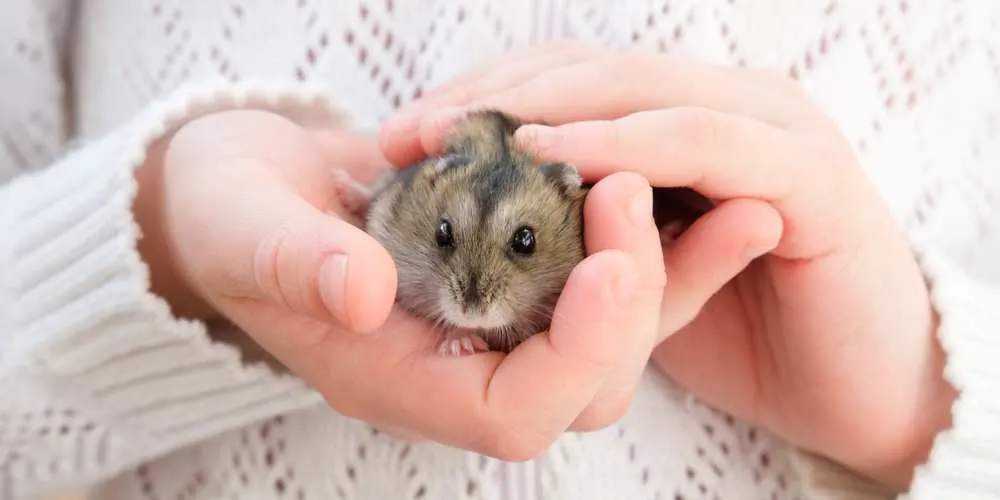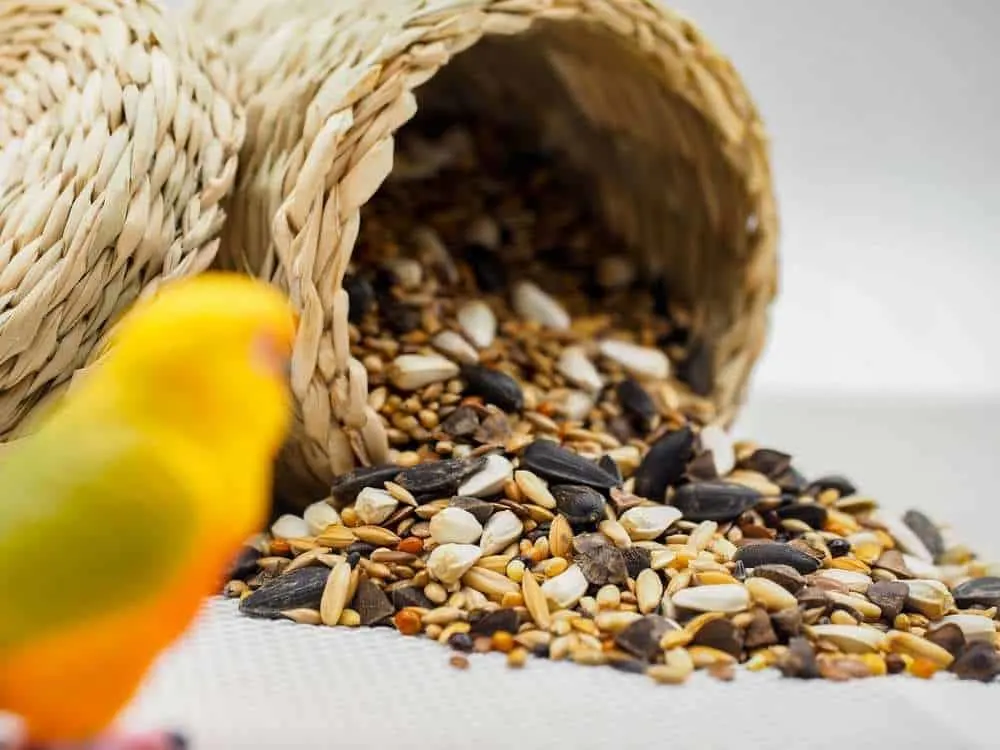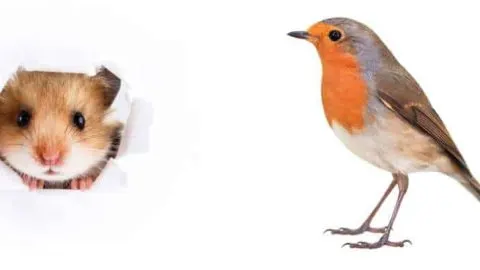Did you get yourself a handful of fur and happiness in the shape of a hamster? If you do, congrats, you will find a cute and energetic roommate in him/her. But how much do you know about caring for hamsters? Let’s talk about this a bit more.
In the wilderness, hamsters feed on veggies, seeds, fruits, and occasionally insects. This variety of food is the best for them since it keeps them healthy. On the other hand, hamsters in captivity are usually fed only by one type of food. This leads to an unbalanced and unhealthy diet that can harm your little furry fellow.
The most common food fed for hamsters is commercial hamster pellets. These specially made pellets should meet all their nutritional requirements, but their diet still needs to be enhanced from time to time.
Hamsters enjoy the occasional treat in the form of fruits, nuts, and seeds. If you have a pet bird at home, you must wonder, can hamsters eat bird food as a treat? Is bird food safe for your hammy?
This article will help you all find out the potential benefits and the potential hazards of giving bird food to your hamster.

Can Hamsters Eat Bird Seed Food?
The short answer is yes, as an occasional treat. But the main question is, should you feed them with bird food? Many hamster owners are not so eager to feed their pet babies with other animal foods since you can never know the exact content, and that can put your hamster’s health at risk.
Birdseed food is usually fine to give to your hammy; however, the answer largely depends on the type of bird food you want to treat your pet.
Different Types Of Bird Food
There are several different types of bird food, and they all have largely varying degrees of quality. There is a wide list of ingredients that fall under “bird food,” and this is an important thing to consider before giving it to your hamster.
The most common bird seed mixes contain different amounts of:
- Sunflower
- Safflower
- Pumpkin
- Peanuts
- Thistle
- Millet
- Corn
- Sorghum
- Rapeseed
The safest bird seeds that hamsters should consume are millets.
Other than seed mixes, birds eat commercial bird pellets too, and these can contain a wide variety of seeds, grains, fruits, and vegetables. Commercial bird pellets may also contain artificial colorants and preservatives that you don’t want to feed your hamster with. Depending on the brand, most are often fortified with vitamins and minerals that are essential for birds, but these pellets are not something you would want to give to your hammy.
Potential Benefits Of Feeding Bird Food
There are loads of benefits from bird food since it contains a wide variety of seeds. But be careful seeds contain a large amount of fat and should only be given in moderation, or your hamster might gain some weight.
One of the most common seeds in bird food is sunflower seed, which is a great source of vitamin C and vitamin A, protein, and fiber. As well, sunflowers contain vital minerals such as calcium, iron, and magnesium. Feeding too much sunflower seed can cause excessive weight gain and diarrhea due to the high content of vitamin C.
Pumpkin seeds are also a great addition to your pet’s diet because they are rich in nutrients like vitamins, minerals, protein, and calcium. Also, do not forget that your hammy has little teeth that need a regular dental workout, and pumpkin seeds hard shells will provide that exercise for them.
Potential Risks Of Feeding Bird Food
The number-one concern when feeding your hamster with birdseed mix is the content of fat. Most seed mixes are mainly based on sunflower seeds and pumpkin seeds which contain high amounts of fat. That is why it is recommended to feed a small handful of mixed seeds once every two or three days.
These seeds should never be a part of your hamster’s regular daily diet since they need high fiber and low fat.
Always check the bird food mixes for other ingredients. Some brands of bird foods contain dried fruits, and some of them may be harmful to your furry fellow due to the large amounts of sugar. Also, these dried fruits may have artificial preservatives that are unhealthy for a hammy.
Foods That Are Usually Found In Bird Food That You Should Avoid Feeding To Your Hammy
As we already mentioned, some food ingredients are not safe for hamsters. These ingredients include some nuts, seeds, and fruits. These are all potentially toxic to hamsters and can be occasionally found in some bird foods. Those are:
- Apple seeds
- Raisins
- Grapes
- Avocado
- Cherry pits (See Also: Can Hamsters Eat Cherries?)
- Elderberries

How To Feed Hamster?
A good and well-balanced hamster food mix is the right diet for the hamster. These food mixtures will provide the nutrients your hamster needs. This leads us to the main question – pelleted hamster food or seed hamster food?
Pelleted hamster food offers a completely balanced diet, and they come in many shapes but usually look like small biscuits, cookies, or cereal. On the other hand, a loose seed mix contains a variety of foods such as grains and dried vegetables along with seeds.
Caution, be aware that hamsters are picky eaters. They are usually not good with loose seed mixes, and from here, they will eat only their favorite items; this is bad since this leads to an unbalanced diet. Pelleted food prevents this from happening, but this food is a bit monotonous, and it can quickly get out of style with your hamster, and he will refuse to eat it.
You can boost their diet with natural food for humans, such as potatoes, cucumbers, carrots, fresh vegetables, plain yogurt, and fruits. But avoid giving other animal food to your hamster since it has a different composition and usually contains additives and ingredients that are not suitable for your furball.
Since we already mentioned fruit as a great treat, you must be aware that this is only in cases when you feed them with small quantities of fruit. This is because the fruit has a natural sugar called fructose. Fructose, when consumed in large amounts, will make hamsters gain weight. When hamsters overeat fruit, they experience diarrhea.
Never give your hamster human food since it is already processed and contains additives, salts, and sugars.
Also, there is one common mistake that many hamster owners make, and that is giving lettuce bad cabbage to your hammy. This is a big no-no since hamsters are rodents and they are not suitable for eating green leafy veggies.
Fresh Foods And Treats That You Can And Can Not Feed Your Hamster With
The rule is that treats should never make up more than 10% of your hamster’s diet. Hamsters can be fed with a variety of human foods as long as you limit them.
Normally skip the human junk food and stick to healthy things like whole grains, veggies, and fruit. Here is the list of human foods that you can offer to your hamster guilt-free:
- Apples without seeds
- Bananas. See Also: Can Hamsters Eat Banana Chips?
- Blueberries
- Strawberries
- Squash
- Sweet potato
- Cooked potato
- Carrots
- Broccoli
- Cauliflower
- Cucumber
- Peas
- Nuts always unsalted
- Pumpkin seeds
- Lentils
- Sunflower seeds
Hamsters love peanut butter, but it must be fed carefully since it can get stuck in their cheek pouches and cause problems. Give it with caution since it is also high in fat and contains some amount of sugar.
Here is the list of food you should never feed your hamster with:
- Apple seeds
- Raw beans and potatoes
- Almonds
- Citrus fruit
- Garlic
- Grapes
- Raisin
- Onions
- Rhubarb leaves or raw rhubarb
- Chocolate
Store-bought treats like yogurt drops and honey/seed sticks are too sugary for a hamster and avoid feeding your pet with it. Hamsters are prone to diabetes, so make sure you avoid sugar in their diet as much as you can.

Final Thoughts
As an occasional treat, bird food is okay for hamsters if you are sure that the brand you use is free of ingredients that are potentially harmful to them. A small handful of bird food can be potentially beneficial to their health, but give it with caution and moderation only.
We have one more tip for you.
Never give an excessive amount of food to your hamster because they will not eat the food. Do you all know how hamsters have big, fat cheeks? Well, they will hide all the excessive food inside the cheeks and remove it when they get to their hiding spot or keep it under the bed.
This is normal for them in the wilderness, but this is a bad habit for pet hamsters since this way, the cage will be dirty all the time. Usually, the food will spoil due to indoor temperatures or get mixed with urine, and this is not what you would want your hammy to ingest.
So make sure you always give the food in the right dosage so that the hamster will chew all the food without remaining.

